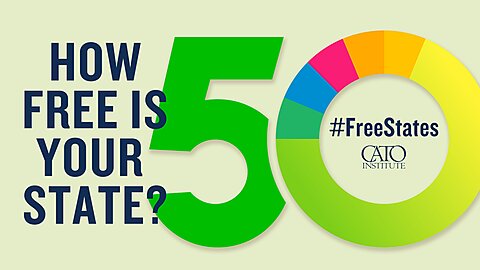Jason Sorens and William Ruger
The new edition of Freedom in the 50 States: An Index of Personal and Economic Freedom is out. This edition is the most up‐to‐date yet, with data good up to the start of this year. It remains the most comprehensive measure of governmental respect for freedom at the state level, with more than 230 policy variables feeding into the scores.
This edition has some exciting new features. With state‐level housing reforms becoming popular, we have added some of these to the index. Some are good for freedom, like legalizing accessory dwelling units, and others are bad for freedom, like letting towns adopt mandatory “inclusionary zoning” standards (price controls based on income).
With the Supreme Court’s recent Dobbs decision, abortion is also a hot topic at the state level. While abortion is not part of the standard index, we offer alternative indices based on pro‐life, moderate pro‐choice, and strong pro‐choice assumptions. We have included a wide range of new states restricting abortion in the wake of the Dobbs decision. In future editions, we will look carefully at the effect these laws actually have on abortion so we can re‐weight them if necessary.
We’ve also added a bunch of new variables in areas like occupational licensing, where other organizations have been increasingly producing research.
This year, we continue to find that states at the top and bottom are moving apart (Figure 1).
New Hampshire just printed the highest freedom score yet seen this century, while New York languishes at the bottom, and Oregon, California, and Hawaii have worsened a lot since 2018.
We also had the opportunity to test the effects of freedom on growth and migration for the past decade and the one before. We continue to find that economic freedom increases subsequent real income growth, while both economic and personal freedoms attract residents. Since these findings have been consistent since we first did this study in 2009, it’s fair to say that we can be confident in a true causal relationship between freedom on the one hand and growth and migration on the other.
Figure 2 plots the inflation‐adjusted rate of growth in personal income against the previous year’s value of economic freedom, by state and year, along with lines of best fit calculated for each Census region. Some regions grow faster than others (the West more, and the Midwest less), but within every region, economic freedom is positively correlated with subsequent growth.
Figure 2: How Economic Freedom Affects Growth, by Region
Looking at change over time is also interesting. Over the 22‐year period for which we have data, the most improved state is New Mexico. This was a bit surprising, but it makes sense when you consider how badly New Mexico was doing in 2000 (48th). They had plenty of room to improve.
Florida, Arizona, and Wisconsin occupy the next three slots, and none of these are surprising. Florida and Wisconsin started growing by leaps and bounds after 2010, and we have to think that the correlation with the administrations of governors Rick Scott and Scott Walker is not a coincidence. Arizona’s growth period dates to the late 2000s. Gov. Doug Ducey was certainly a leader on regulatory policy. But Arizona has also improved school choice quite a bit, and the ballot initiative has helped liberalize their criminal justice policies and land‐use freedom (as well as taking away labor market and tobacco freedoms).
This new edition is fun to play with and explore. Check it out, and let us know what you think!




